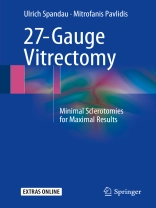This book provides step-by-step instructions on how to operate with 27G instrumentation in a wide range of surgical indications, including vitreous floaters, macular holes, dropped nucleus, retinal detachment, diabetic retinopathy, submacular hemorrhage, retinopathy of prematurity and much trauma. All surgeries are approached in cookbook fashion, with initial coverage of the “ingredients” (devices and instruments) and then meticulous description of preparation and performance with supporting photographs, drawings and videos. In addition, the differences and benefits in comparison with 23G and 25G vitrectomy are highlighted.
Small-gauge vitrectomy has radically changed the ways in which vitrectomy is performed. 27G vitrectomy is the most recent and most exciting development in small-gauge vitrectomy. The healing time is faster but the small diameter prolongs the duration of surgery. This obstacle has been overcome with powerful new vitrectomy machines and revolutionary vitreous cutters with two cutting blades making 27G vitrectomy as fast as 25G. This new equipment has expanded the indications for 27G surgeries immensely from detachment surgery to retinopathy of prematurity and the advent of new instruments may make 27G the gold standard in the future. This book, written by authors with huge experience in 27G vitrectomy, will enable surgeons to fully exploit its advantages.
สารบัญ
27G: Development of 27G.- Differences between 27G and 25G /23G.- Disadvantages.- Advantages. Tools for 27G: Devices.- Instruments.- Future Developments / Needs. Techniques for 27G: Endoillumination.- Usage of Vitreous Cutter.- Posterior Hyaloid Detachment.- Membrane Peeling.- Delamination of Diabetic Membranes.- PVR Treatment.- Hemostasis and Marking of Retinal Tears.- Laser Treatment.- Fluid Air Exchange. Surgical Indications: Non Combined Vitrectomy.- Combined Phaco Vitrectomy.- MICVIT (Microincisional Cataract / Vitrectomy).- Vitrectomy for Floaters.- Macular Pucker.- Macular Hole.- Vitreomacular Traction.- Dropped Nucleous.- Combined 27G PPV + Secondary IOL implantation.- Retinal Detachement.- Diabetic Retinopathy.- Silicone Oil Tamponade.- Silicone Oil Extraction.- Pediatric Vitrectomy.- Vitrectomy for Long Eyes.- Hybrid Procedures.
เกี่ยวกับผู้แต่ง
Ulrich H.M. Spandau, MD, Ph D, is Assistant Professor in the Department of Ophthalmology, University of Uppsala, Uppsala, Sweden. After graduating in Medicine from the University of Würzburg, Germany, Dr. Spandau completed residencies in the Departments of Ophthalmology at the University of Heidelberg and University of Mannheim-Heidelberg and surgical training at the Eye Clinic, Koblenz, Germany. He became an accredited Specialist in Ophthalmology in 2003. In 2006 he was appointed Vice Director of the Department of Ophthalmology at University of Mannheim-Heidelberg and since 2008 he has been Attending Surgeon and Head of Ocular Surgery at the Department of Ophthalmology, University Hospital Uppsala. He is the author of more than 50 articles in peer-reviewed journals and the previous Springer books Complications During and After Cataract Surgery (co-author Gabor Scharioth, ISBN 9783642544484, 2014) and Practical Handbook for Small-Gauge Vitrectomy (co-author Heinrich Heimann, ISBN 9783642232930, 2011).
Mitrofanis (Fanis) Pavlidis, Priv. Doz. Dr. med., works at the Augencentrum Köln (Cologne Eye Center), Germany, where he specializes in vitreoretinal diagnosis and surgery. Dr. Pavlidis studied Human Medicine at the University of Leipzig before specializing in Ophthalmology and completing his Habilitation in 2006 at the University of Münster. After working in vitreoretinal surgery and diagnostics at the Recklinghausen Eye Center, he was responsible for developing and leading the Department of Retinal Diagnostics and Vitreoretinal Surgery at the Medical Center Athens/ Laservision Athens, Greece. He joined the Augencentrum Köln in 2011. Dr. Pavlidis was one of the first ophthalmologists in Germany to work with 27G small-incision vitrectomy. He is the author of 26 original articles in peer-reviewed journals.












